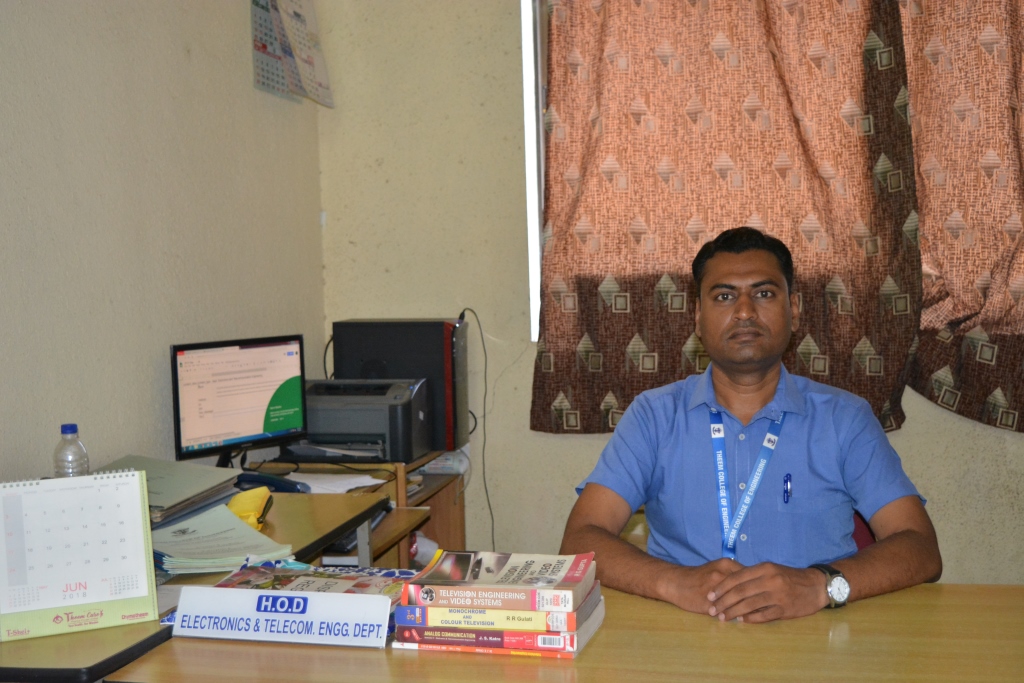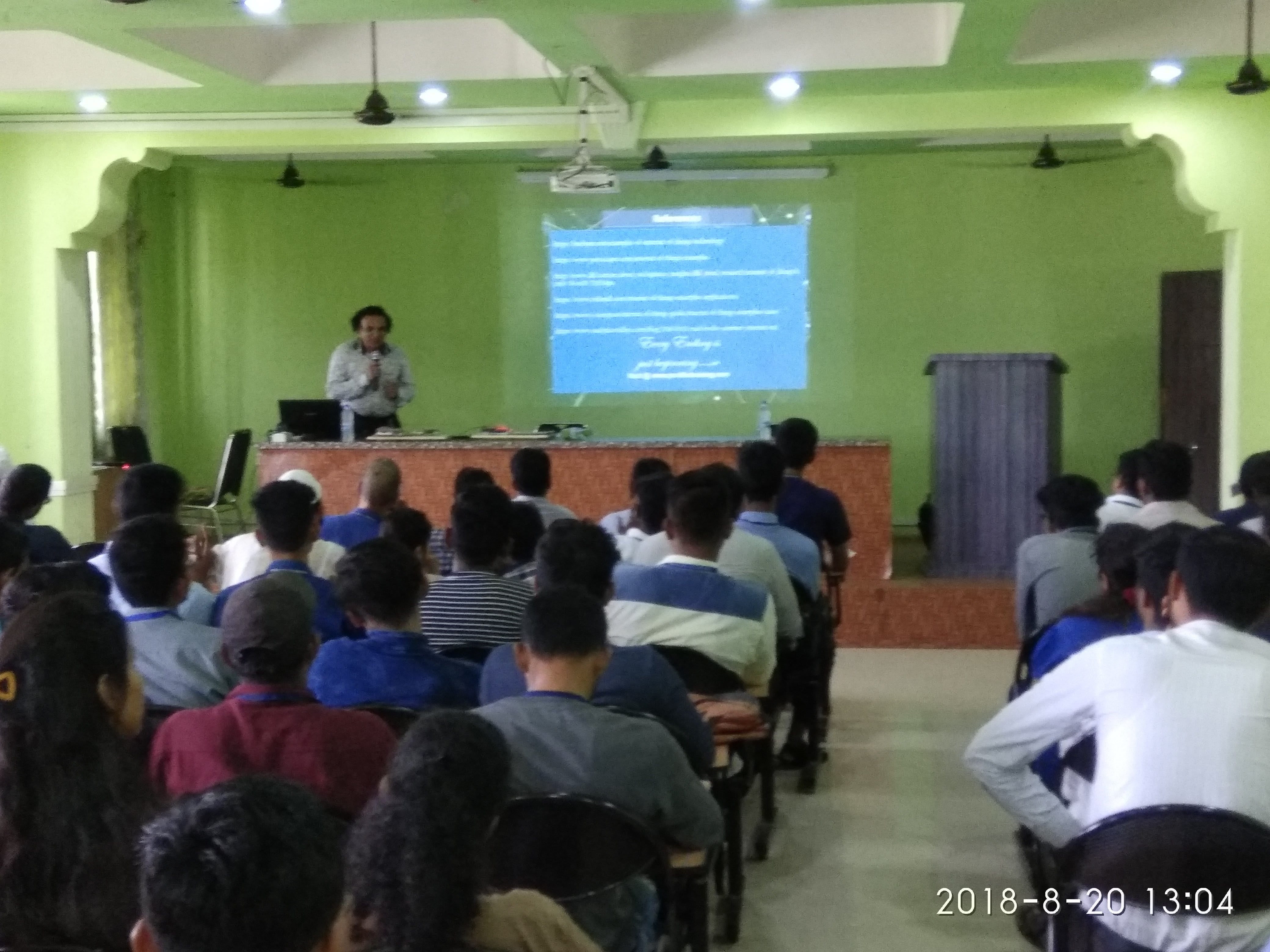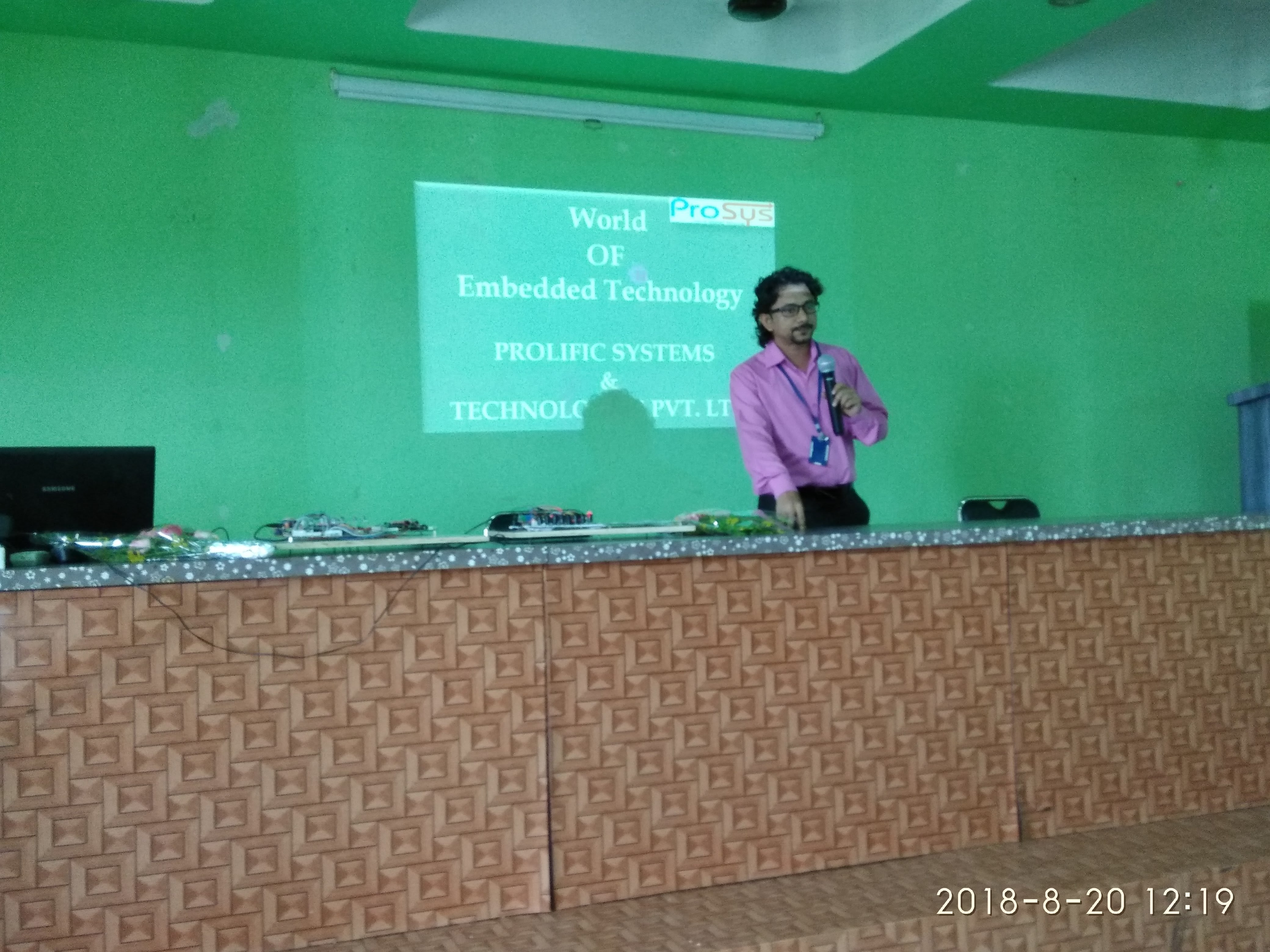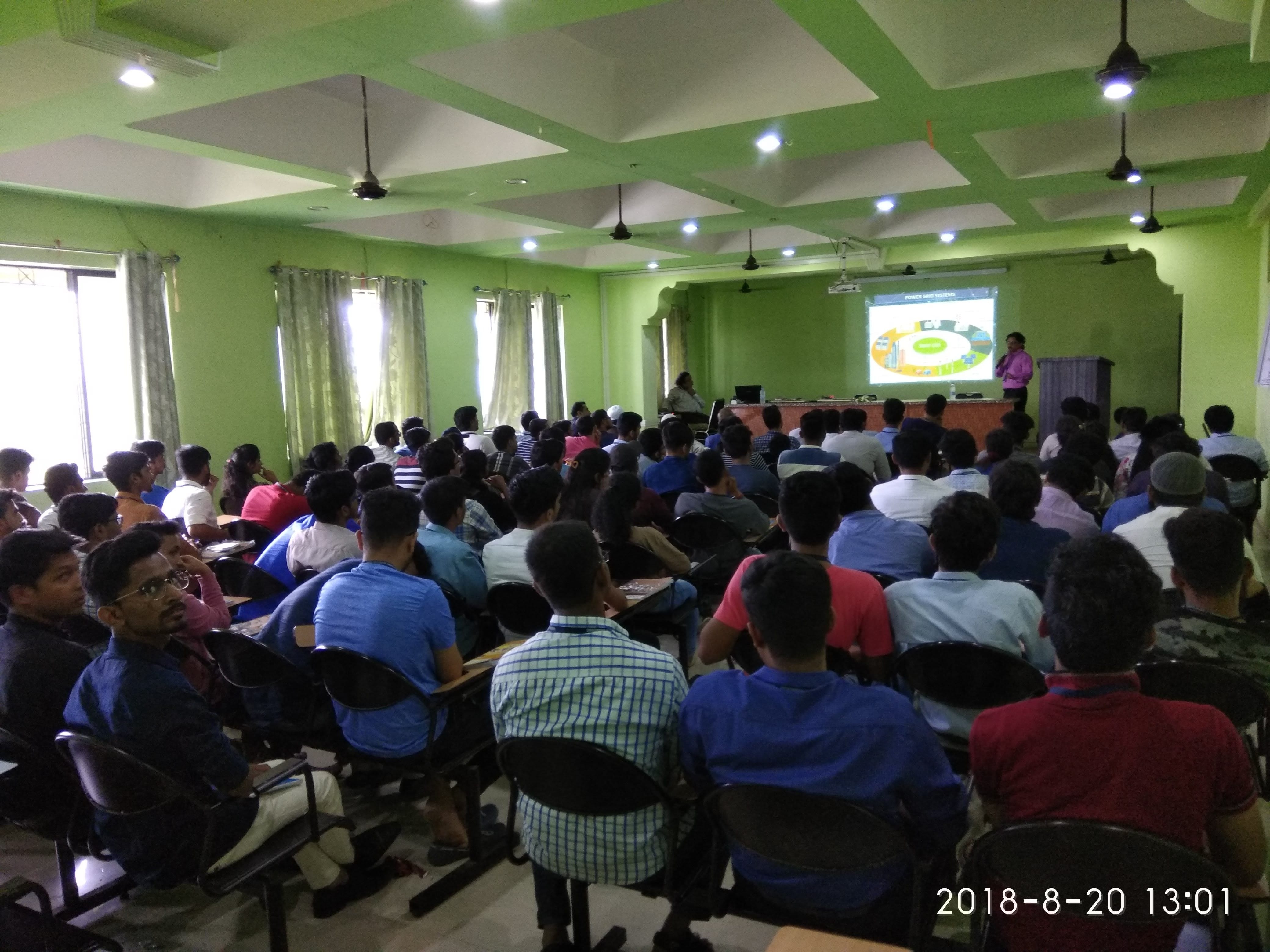Welcome to Electronics & Telecommunication Engineering
The Department of Electronics and Telecommunication was established in the year 2009 with the intake capacity of 60 with the mission to impart the quality education to the budding engineers. As the 21stcentury is the century of communication and competition, our main motto is to nurture graduates who will be technically sound, well cultured and globally competent. Currently, the department has 08 full time, dedicated, well qualified and experienced faculties having professional experience from 4 to 16 years and four supporting staff. Our faculty members are experts in the areas they teach. Department has 08 well-equipped laboratories with advanced equipment & softwares set up for supporting our curricula, especially in the areas of electronics and communication. The department is associated with IETE and has been actively involved in organizing various state & National level technical events like Promethin; social events like Blood donation camp, career guidance etc. and also in various co-curricular & extra-curricular activities. We emphasize team work to give opportunity to each student to benefit from the ideas and intelligence of their classmates. We have the tradition of excellent results. In order to give industry exposure to students, the department has organized industrial visits. Also, industry-institute interaction is maintained by organizing guest lectures, workshops of industry professionals and academicians.
More Info...
Vision
Generating curiosity among students to become researcher, responsible technocrats and innovative professionals in the field of electronics and telecommunication engineering.
Mission
M1. To impart students valuable technical knowledge and creativity through excellent teaching-learning process
M2. To enable students facing engineering challenges by providing a unique learning environment and more industrial practical exploration
M3. To provide ethical and value-based education to develop engineering technocrats and professionals for the service of the society and nation
A graduate of electronics and telecommunication engineering program will be able to:
PO1: Engineering Knowledge: Acquire and apply knowledge of Mathematics, Science and Electronics and
Telecommunication Engineering fundamentals to solve complex engineering problems
PO2: Problem Analysis: Identify, formulate and analyze complex Electronics and Telecommunication Engineering problems to derive conclusions
PO3: Design & Development of Solutions: Design algorithm, system, and circuit to develop solutions for
complex Electronics and Telecommunication systems to meet desired needs.
PO4: Conduct investigation of Complex Problem: Design and conduct experiments, analyze and interpret data for analog, digital Electronics and Telecommunication systems.
PO5: Modern Tools Usage: Identify and apply appropriate techniques and modern engineering tools in the
modeling and design of Electronics and Telecommunication Engineering practice.
PO6: Engineer and Society: Apply appropriate knowledge to assess societal, health, safety, legal and cultural
issue and consequent responsibilities to the professional engineering practice.
PO7: Environment & Sustainability: Understand the impact of Electronics and Telecommunication Engineering solutions on society and environment for sustainable development.
PO8: Ethics: Apply knowledge of Electronics and Telecommunication Engineering in profession with ethical responsibilities.
PO9: Individual & Team work: Function effectively both as an individual and as a member or a leader in a
multidisciplinary team.
PO10: Communication: Effectively communicate, write report, design documentation and make presentations for engineering community and society.
PO11: Project management & Finance: Demonstrate knowledge and an understanding of management
principles and apply them while managing projects.
PO12: Lifelong Learning: Recognize the need and engage independently for lifelong learning in the context of technological changes.
Programme Specific Outcomes
After successful completion of the program,
PSO1: Engineering Graduates will be able to apply the knowledge of engineering specialization in designing, analyzing, implementing and testing electronic system.
PSO2: Engineering Graduates will be able to use all types of software and hardware tools to provide sustainable solutions to electronic and telecommuncation problems.
Programme Educational Objectives
PEO1: Imparting the knowledge of a solid foundation in mathematics, science and engineering
fundamentals to pursue both intellectual and professional growth.
PEO2: Producing technically sound and competent graduates with the ability of designing, analyzing, developing and implementing electronic system.
PEO3: Preparing the engineering graduates productive and successful in their career.
PEO4: Catering students in learning experience of positive attitude, ethical values, effective communication and interpersonal skills.

Prof. Attarde Khemchandra Nathu
HOD, Electronics & Telecommunication Department
Welcome to the Department of Electronics and Telecommunication Engineering at Theem College of Engineering, Boisar. The Department of Electronics and Telecommunication is established in the year 2009 with the intake capacity of 60 with the mission to impart the quality education to the budding engineers. As the 21stcentury is the century of communication and competition, our main motto is to nurture graduates who will be technically sound, well cultured and globally competent. Currently, department has 08 full time dedicated, well qualified and experienced faculties having professional experience from 4 to 16 years and four supporting staff. Our faculty members are experts in the areas they teach. Department has 08 well-equipped states of laboratories with advanced equipment & software’s set up supporting our curricula, especially in the areas of electronics and communication. The department is associated with IETE has been actively involved in organizing various state & National technical events like Promethin; social events like Blood donation camp, career guidance etc. and also in various co-curricular & extra-curricular activities. We emphasize team work to give opportunity to each student to benefit from the ideas and intelligence of their classmates. We have the tradition of excellent results. In order to give industry exposure to students, the department has organized industrial visits. Also, industry-institute interaction is maintained by organizing guest lectures, workshops of industry professionals and academicians.
Event Description Photos
| Seminar on “Process Automation in PLC/SCADA/DCS” | The main objective of this seminar is to make the aspiring engineers acquainted with the conceptual as well as practical knowledge of the Industrial Automation & latest technologies being used to achieve industrial automation. The idea of organizing this seminar is to inculcate the basic fundamentals of automation in the students and provide them with a platform to work on, In the near Future. |  More Photos |
| Seminar on “Embedded/IOT” | The main objectives of this seminar is to study different challenges of IoT from embedded design and network level perspective. |  More Photos |
Teaching Staff

| Designation: | Assco Professor & Head |
| Qualification: | ME, BE |
| Area of Interest: | Communication Engineering |
| Email: | khemchandra.attarde@theemcoe.org |

| Designation: | Asst Professor |
| Qualification: | ME, BE |
| Area of Interest: | Digital Electronics |
| Email: | amjed.syed@theemcoe.org |

| Designation: | Asst Professor |
| Qualification: | ME, BE |
| Area of Interest: | Image Processing,signal Processing,electronics Devices And Circuits |
| Email: | rajesh.patil@theemcoe.org |

| Designation: | Asst Professor |
| Qualification: | ME EXTC, BE EXTC |
| Area of Interest: | Vlsi |
| Email: | tilottama.deore@theemcoe.org |
Non-Teaching Staff

| Designation: | Attendant |
| Qualification: |

| Designation: | Lab. Assistant |
| Qualification: | B.E (EXTC) |
Name of the Laboratory Description
| Digital Electronics Lab
View Lab | In the era of digital techniques, it's very important to be aware of digital concept and their applications. This lab transfers all the information about digital electronics circuits and their significance in electrical engineering. |
| Digital Signal Processing
View Lab | The Digital Signal Processing Lab is based on MATLAB tools, xillinx software, microwind software, scilab software, EMU 8086 simulator, MCU 8051 simulator, Proteus simulator, Express PCB software, which help the student to learn, evaluate, analyse, design and simulate the experiments .The lab equipped with 24 higher configuration PCs. |
| Tv And Video
View Lab | The main objective of this lab course is to study and understand the fault finding that occures in various section pertaining to monochrome and color TV receiver |
| Microwave And Antenna
View Lab | The mission of this lab is to design , analyze the characterization of RF and Microwave components. The experiments conducts include S-parameter measurements, radiation and terminal properties of horn, slot, array, reflector, strip and patch antennas. |
| Fiber Optics Communication
View Lab | The purpose of this lab is to explore optical communicatrion with the help of optical fiber kit. The lab allows the students to understand varies types and structure of optical fiber. It explains how analog & digital communication can be achieved through optical fiber. it also explains varies losses which occur in optical communication system. Voice communication through optical fiber can be achieved in this lab. Numerical Aperture and various other parameters of optical fiber can observe in this lab. |
| Digital Communicatiuon
View Lab | The purpose of this lab is to explore knowledge of Digital Communication Engineering . This LAB is well Equipped with DSO (Digital Storage Oscilloscope). The lab covers Generation and Detection of various Digital Modulation Techniques such as ASK,FSK, PSK,QPSK,MSK,QAM Error control coding, CRC etc. |
| Electronic Devices And Circuit
View Lab | The lab provides the foundation of electronics engineering. This lab aims at providing students the knowledge about various electronic devices. circuits and their intended use in various applications. |
| Basic Communication
View Lab | The purpose of this lab is to explore knowledge of Analog Communications Engineering. The lab cover the performance and application of various analog modulation techniques such as contineous modulation, pulse modulation etc., study of Multiplexing Techniques, and study of TRANSMITTER-RECEIVER. |
Notice Board
| Sem 3 | Applied Mathematics- III | To understand the basic concept of Laplace Transformation | To solve Fourier Transformation | To solve Vector differentiation and integration | To understand basic knowledge knowledge of Complex Variable and Bessel's Function | Electronic Devices and Circuits I | Understand the basic components like resistor, capacitor,inductor and analyze the characteristics of PN junction Diodes | Do analysis design of rectifiers with filters and design of zener voltage regulator | Understand operation of BJT and design and analyse different configuration of the BJT amplifier | Understand operation of JFET and design and analyse the FET amplifier | Digital System Design | Understand various number systems and codes and their inter conversions, Also perform arithmetic operations | Understood Boolean algebra for minimization and implementation of logic functions and various Combinational circuits | Analyze design and implement sequential logic circuits | Analyze digital systems using PLD and Simulate and Implement Combinational and sequential circuits using VHDL systems. | Circuit Theory and Networks | Apply their knowledge in analysing Circuits by using network theorems. | Apply the time and frequency method of analysis. | Find the various parameters of two port network. | Apply network topology for analyzing the circuit | Synthesize the network using passive elements. | Electronic Instrumentation and Control | Understand the various types of sensors and transducers as well. | Students will get the idea about data acquisiton system. And will be able to find the transfer function of a system. | Find time domain and frequency domain analysis of system and the stability using root locus technique as well. | to find stability using bode plot method and will understand Different stability analysis methods. | OOP using JAVA Laboratory | Code a program using java constructs. | Understand fundamental features of an object oriented language: object classes and interfaces, exceptions and libraries of object collections. | Develop a program that efficiently implements the algorithm for given tasks. | Utilize the knowledge acquired in this course to develop higher level algorithms. |
| Sem 4 | Applied Mathematics IV | To understand Euler's Lagrange's equation and higher order derivatives | To understand importance of vector spces in electronics and telecommunicaiton engineering | Apply method of calculus of variations to specific systems, demonstrate ability to manipulate matrices and compute eigenvalues and eigenvectors | To understand the relevance of complex variables in various facets of engineering | Analog Electronics II | Know about the various frequency responses of BJT and MOSFET amplifiers. They also got the idea of the effects of various capacitors along with the merger of various configurations. | Understand about the basic difference between the implementation of BJT and MOSFET based differential amplifiers. They also got the idea of the CMRR along with the small signal analysis. | Perform analysis of BJT, MOSFET current sources. They will also be able to overcome the drawbacks of Two transistor current sources by using the special ones. | Distinguish between the various types of power amplifiers which would help them design the required ones according to the given specifications. | Get the idea of the effect of HF and its impact on op-amp gain. They will also be able to use them in many practical applications where the demand of voltage gain would be very high. | Get the idea of voltage regulators in different configurations. | Microprocessors and Peripherals | Students will get the idea of Architecture of 8085 and 8086 Microprocessor | Understand Instruction set and programming of 8086 and students will be able to do interfacing with 8086 and applications. | Students will get the knowledge of ADC, DAC interfacing with 8086 and its application | Perform 8086 Microprocessor interfacing, also get the basic idea of advanced microprocessors. | Wave Theory and Propagation | Students will get the understanding of basic laws of electrostatics and magnetostatics in vector form. | Get the understanding of the propagation of wave in different media like dielectric and conducting media by solving wave equation and find parameters of media | Calculate energy transported by means of electromagnetic waves from one point to another and to study polarization of waves. | Solve electromagnetic problems using different numerical methods. | Understand with the propagation of the waves by different types such as ground waves and space waves. | Get acquainted with the factors affecting the wave during its propagation and understand sky wave propagation; related parameters such as MUF, skip distance and critical frequency | Signals and Systems | Understand types of signals in the time and frequency domains and its significance. | Understand system, classification of system and analysis of system using Laplace transform. | To find the z transform of signals and Fourier series of continuous and discrete time signals as well. | Students will get the idea about continuous time Fourier transform and discrete time Fourier transform which is useful in understanding behavior of Electronics circuits and communication system. | Control Systems | Understand the fundamental concepts of control system, types of models, signals and their response. | Find the mathematical modeling of system, Controllability and Observability of the system | Understand the stability analysis in time and frequency domain. | Get the idea about optimal and adaptive control system |
| Sem 5 | Microcontrollers and Applications | Get the idea of difference between microprocessor and microcontroller, purpose advantages of microcontroller 8051. | To understand different operations, instructions, assembly programming and applications of 8051 microcontroller hardware and software. | Understand architecture of ARM7, data types, different codes, movement operations, loops, assembly programming for ARM7 as well. | Get the idea about embedded system, its applications digital camera, stepper motor controller. | Analog Communication | Students will the idea about basics of communication system and understand the need of modulation and demodulation. | Recieve knowledge of amplitude modulation of demodulation and angle modulation and demodulation as well. | To understand different types of radio receiver and the sampling techniques for different types of signals. | To understand the concept of different pulse modulation techniques, TDM and FDM | Random Signal Analysis | Apply theory of probability in identifying and solving relevant problems | Define and differentiate between random variables through the use of Cumulative distribution function CDF and probability distribution function PDF as well as marginal and conditional CDF, PDF. | Get the basic idea of functions random process and will be able to determine the response of a linear time invariant sytem to a random process | Got the basic idea of sequence of random variables, convergence, markov chain and queuing theory | RF Modeling and Antennas | Design lumped and distributed element filters | Identify basic antenna parameters required for the analysis of simple wire antennas | Describe various antenna structures and differentiate them on the basis of their application and performance. | Analyze and design antenna arrays and study wireless transmit-receive systems | Integrated Circuits | Understand the fundamentals and areas of applications for the Integrated Circuits using OPAMP. | Design filters, oscillators and non linear application like generators, rectifiers and comparators | Design Special Purpose Integrated Circuits like 555 timer with real time applications | Understand the differences amongdifferent voltage regulators and their uses and analyze Counters, Shift Registers and ALU |
| Sem 6 | Digital Communication | Understand the basics of information theory and coding techniques | Determine methods to mitigate inter symbol interference in baseband transmission system | Describe and determine the performance of different error control coding schemes for the reliable transmission of digital representation of signals and information over the channel | Understand various spreading techniques and determine bit error performance of various digital communication systems | Discrete Time Signal Processing | To understand Transform Analysis of Linear Time Invariant System | To design filters and their implementation using various techniques | To understand multi rate signal processing | To understand various techniques for approximations in digital signal processing parlance and applications of the same | Computer Communication and Telecom Networks | To understand various principles of network applications | To understand the transport layer protocols and their reliability | To understand various network layer services and protocols | To understand various data link layer services, protocols and physical layer services | Television Engineering | Get the understanding of the basics of Analog TV systems | Students will get the understanding of the basics of picture transmission and reception | Become well conversant with new development in video engineering. | Understand, use and working principles of latest display like HDTV, LCD, LED, Plasma and large plat panel monitors. | Operating Systems | Understand the role of an operating system and Compare between different algorithms used for management and scheduling of processes, Memory and input-output operation. | To understand File Management and Input Output Management | To understand Unix and Linux Operating System | To understand Real time operating systems | VLSI Design | Get basic idea of scaling and its effect, fabrication steps and Lambda rules | Get the idea about the different design styles and the difference between them | Design different types of inverters with static and dynamic analysis | Get the idea about the static and dynamic RAM, different flash memories, read and write process in the memory |
| Sem 7 | Image and Video Processing | Understand basics of Image aand video processing and use various transforms to interpret and analyze 2D signals | Perform time and frequency domain image enhancement and image restoration | Understand methods for image segmentation and various morphological tools used for practical applications. | understand basics of video processing and various methods of motion estimation | Mobile Communication | To get the idea of different multiple access techniques, basics of cellular system and processes in cellular systems. | To understand the idea of different 2G technologies i.e. GSM , IS-95 CDMA, architecture and channels in CDMA | Get the idea of evolution of GSM to 3G technology, Architecture of IMT 2000 | To understand the difference in 3G/4G technology, mobile adhoc network, mobility management, wireless sensor network and RFID technology | Optical Communication and Networks | Get the idea about properties of light, types of fiber | Get the idea about the structure of light sources, detectors & multiplexers. | Get the knowledge of various components used in optical network system & losses in optical fiber. | Know the designing & operating principals of modern communication system. | Microwave and Radar Engineering | Get the idea about Microwave frequecy, their bands and application. | Get the idea about the different types of waveguides and the microwave components with the help of Scattering parameters | Design different matching methods using Z & ZY Smith chart. The differents matching are Lumped matching, Single stub matching and Double stub matching. | Get the idea about the principle of RADAR, its range equation, Doppler effect and various types of RADAR and different application | Data Compression & Encryption | To compress any given text sequence using various techniques | To understand various image, audio and video compression standards. | To understand various security goals and encryption standards | To understand symmetric and asymmetric key cryptography techniques and their implications in network security |
| Sem 8 | Wireless Networks | Describe the phases of planning and design of mobile wireless networks | Compare personal area network ( PAN) technologies such as Zigbee, Bluetooth etc | To understand details of sensor network architecture, traffic related protocols , transmission technology etc | To Understand middleware protocol and network management issues of sensor networks | Satellite communication and Networks | Get the idea about basic concept of satellite system & launching techniques. | Get the idea of space segment subsystems & earth segment. | Analyze link budget for satellite link. | Get knowledge of various access methods & satellite applications. | Internet and Voice Communication | To understand TCP/IP networking model and configuration of Application Layer | To understand Transport layer and and its underlining functions in TCP Protocol | To understand the Internet Protocol and its various standards and services | To understand the real time working of audio and video in communication | Telecom Network Management | Demonstrate broad knowledge of fundamental principles and technical standards underlying telecom networks | To understand Internet Management using SNMP Protocol | To understand various broadband networks and services | To understand various network and telecommunication management principles |










